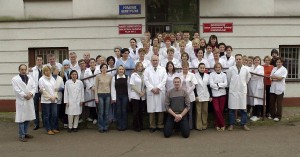
The International Hereditary Cancer Center Team
Early cancer detection and prevention are becoming the critical priority of public health policies across the world. In this endeavor, genetic research is of paramount importance for at least two reasons:
- It is becoming increasingly clear that most forms of cancer have genetic origins
- Identifying cancer predispositions in early stages offers better chances of survival and is more cost-effective than later-stage treatment.
Cancer-related genetic research seeks to identify patterns, which indicate abnormal mutations. In order to facilitate such identification, it is important to develop large databases and registries of homogenous populations. The International Hereditary Cancer Center (IHCC) in Szczecin, Poland is a global leader in this field. IHCC was created in 1992 as a part of the of the Pomeranian Medical University (PMU). It is headed by its Professor Jan Lubinski. IHCC has created the largest hereditary cancer databank in the world, comprising 1,250,000 personal records and DNA samples from 120,000 individuals. IHCC has stimulated the development of genetic cancer diagnostics centers in Poland. Under the impulsion and guidance of IHCC, a network of 22 such centers has been created across Poland. IHCC has stimulated the development of an active international research network. It has coordinated two cancer registry projects funded by the European Commission. IHCC research has to significant discoveries concerning early detection of most common forms of cancer such as breast cancer (BRCA1 and BRCA2) and colon (HNPCC). Those discoveries have been published internationally and have been subject of patent filings. This site presents:





